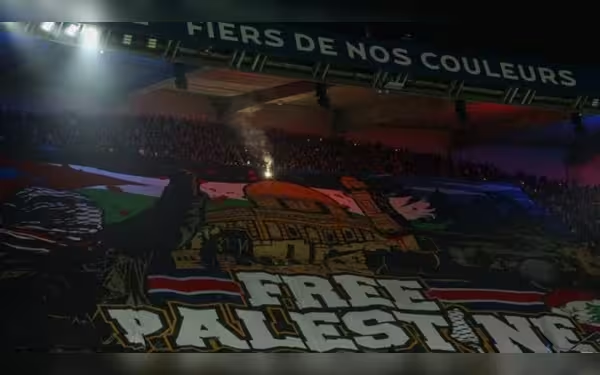Sunday, December 22, 2024 08:30 AM
French Minister Condemns PSG 'Free Palestine' Banner at Champions League Match
- French minister calls for politics to stay out of sports.
- PSG distances itself from controversial banner display.
- Political groups divided over the message of the banner.
 Image Credits: urdupoint
Image Credits: urdupointFrench minister criticizes PSG for 'Free Palestine' banner, emphasizing the need to keep politics out of sports.
In a recent incident that has sparked significant debate, a large banner reading "Free Palestine" was displayed by Paris Saint-Germain (PSG) supporters during a Champions League match. This event took place at the Parc des Princes stadium in Paris, coinciding with heightened tensions in the Middle East, particularly between Israel and Palestinian militant groups. The banner not only featured the slogan but also depicted a bloodstained Palestinian flag, a masked figure, and other symbols related to the ongoing conflict.
French Interior Minister Bruno Retailleau expressed strong disapproval of the banner, stating that it had "no place in this stadium." He emphasized the importance of keeping politics out of sports, which he believes should serve as a unifying force. Retailleau's comments reflect a broader concern among officials about the potential for political messages to disrupt the spirit of sporting events.
In response to the incident, Othman Nasrou, the junior minister responsible for combating discrimination, has called for a meeting with key figures from PSG and the French Football Federation. He pointed out that the size of the banner suggests that the club should have been aware of its display. This raises questions about the responsibilities of sports clubs in monitoring the actions of their fans.
On the other hand, the banner received support from some political groups in France. Manuel Bompard, a representative of the hard-left France Unbowed party, argued that messages promoting peace should be welcomed in football stadiums. He criticized the government's stance, labeling it as an attempt to criminalize support for the Palestinian people.
PSG, which has been a dominant force in French football since its acquisition by Qatar Sports Investments in 2011, distanced itself from the banner. The club stated that it was unaware of the plan to display such a message and reiterated its commitment to maintaining the Parc des Princes as a space for football fans to come together, free from political influences.
The controversy surrounding the banner has also drawn reactions from various community leaders. Yonathan Arfi, president of the Representative Council of Jewish Institutions in France, condemned the display, arguing that it incited hatred rather than promoting peace. He highlighted the imagery used in the banner as particularly troubling, suggesting it undermined the very message of unity that sports should embody.
As the situation continues to unfold, it raises important questions about the intersection of sports and politics. While many believe that football should remain a neutral ground, others argue that it can serve as a platform for raising awareness about global issues. The challenge lies in finding a balance that respects the spirit of the game while acknowledging the realities of the world outside the stadium.
The incident at the PSG match illustrates the complexities of expressing political views in sports. As fans and clubs navigate these sensitive issues, it is crucial to foster an environment where dialogue can occur without compromising the integrity of the sport. Ultimately, the goal should be to promote understanding and unity, both on and off the field.













